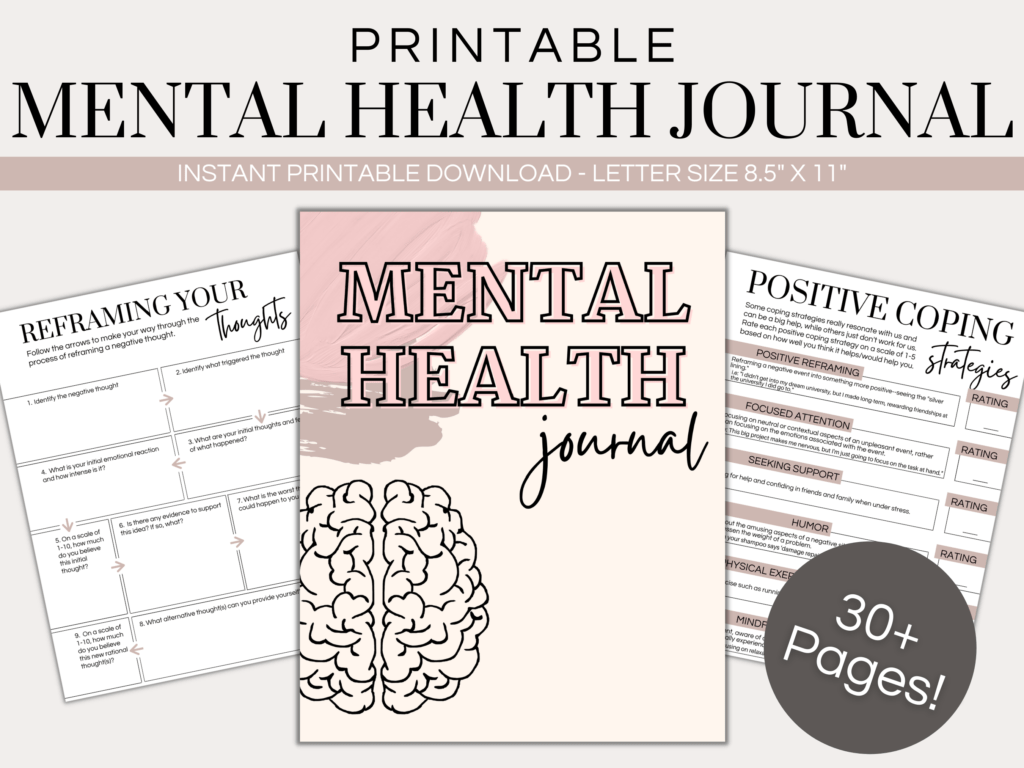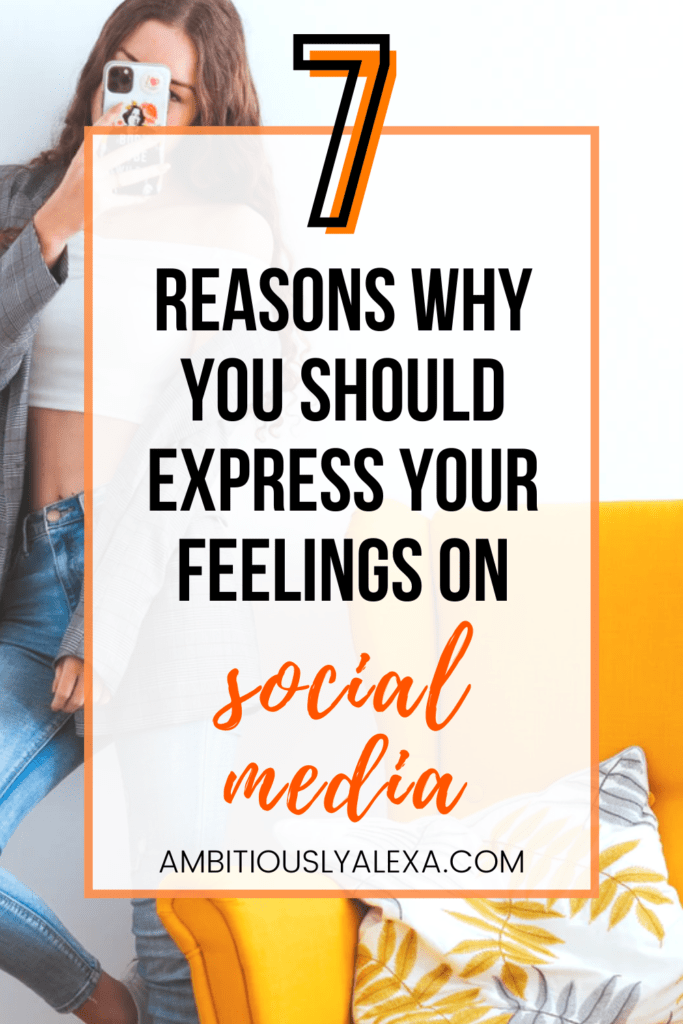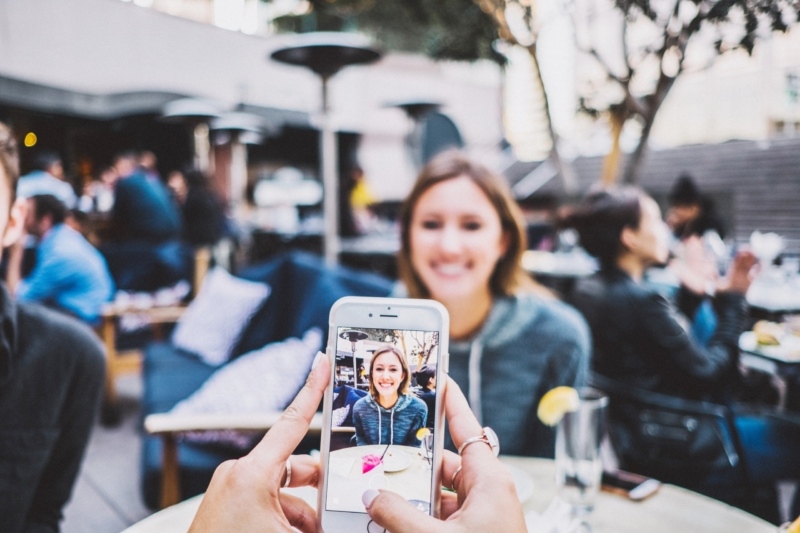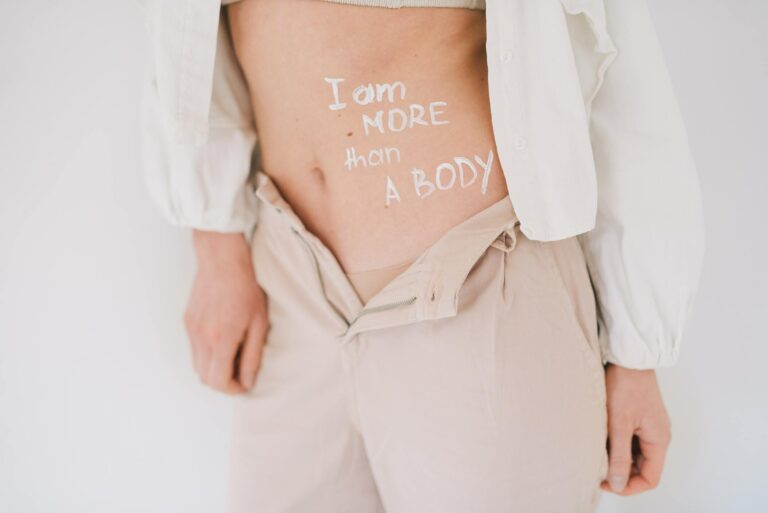Why Expressing Your Feelings on Social Media Can Be Good
This post contains affiliate links and I may receive a small commission (at no extra cost to you) if you sign up or purchase products or services mentioned. Read the full disclosure here.
Last Updated on June 25, 2023
“Social media is just a highlight reel,” you’ve probably heard before.
As an unspoken rule, many people only post the picture-perfect positive moments of their lives–in the form of a “highlight reel.” Expressing your feelings on social media? Hardly viewed as favorable.
This is good and bad. On one hand, it’s great that social media is an aspect of our lives that we can control. We don’t have to share the ugly moments if we don’t want to. And having control over what we share with the world is a great feeling.
On the other hand, this behavior contributes to insecurity and social comparison. If we only see our peers at their best, through the lens of these “perfectly” curated pictures and status updates, we start to believe that our peers are, well, perfect. And that we, in comparison, are so not.
But what if we took a different approach? What if we weren’t so afraid to open up a little and be vulnerable on social media?
Expressing your feelings on social media actually can be a good thing. It helps bring us back down to earth and realize that in reality, we all have our problems. Our bad days.
And that there’s no sense in pretending that some of us have it more under control than others.
This post is all about expressing your feelings on social media.
Expressing your feelings on social media destigmatizes sharing emotions and mental health struggles
If people see through others that it’s okay to share their emotions and mental health struggles, they will feel comfortable to follow suit.
It can be inspiring to see someone open up on social media and talk about the struggles they’re facing, especially if it’s out of character from their typical online persona.
The more of this behavior we see, the more we will feel that it’s acceptable for ourselves to do the same. It can feel comfortable and reassuring.
And the more we get comfortable sharing the reality of our emotions and struggles, the less stigmatized these things become.
I’m already starting to notice a trend in casually talking about going to therapy on social media. This totally helps normalize therapy and taking care of our mental health, which is fantastic!
And it should be integrated in casual conversation more often. Would you be looked at as “brave” or even “taboo” for talking about going to a doctor’s appointment? No! So being able to bring up a therapy appointment in casual conversation should be no different.
The goal is to normalize.
Did you know that I offer a printable mental health journal that will help you understand your emotions and reframe negative thought patterns?
As someone who’s always looking for ways to approach my emotions healthily and turn my negative thoughts into rational ones, I knew just how important it was to create a resource that will actually help you understand your inner-dialogue and coping habits.
Go check it out and see the printable mental health journal for yourself!

It encourages authenticity
Pretending like we have it together 24/7 just isn’t real life. Being happy, positive, and confident ALL the time is not reality.
What is reality is acknowledging that some days will be bad days. Sometimes life just isn’t going how we planned. Sometimes we hit a road bump and are having a hard time getting past it.
You don’t need to spill a 4 paragraph-long vent on Instagram about how your life isn’t going so great if you don’t want to. But you don’t need to feel pressured to hide the fact that you experience bad days, either.
If you open up, even just a little, you might even find that people are going through the exact same thing you are. People find relatability in that, and it can turn social media into a more authentic environment. It encourages others not to fear showing the “raw and real” side of their lives, too.
Social media can be a particularly great tool for those with social anxiety
Social media can be a valuable outlet for social anxiety sufferers because it allows them to reach out and stay connected in a more undirected manner.
It can feel less daunting than interacting face-to-face or over the phone. Even if you don’t have social anxiety but are simply introverted, you may find interacting on social media to be less draining than interacting in person.
As someone who struggles with social anxiety and is an introvert, I have a much easier time expressing myself through written words in a more indirect way rather than verbally. Maybe you can relate!
Expressing your feelings on social media offers emotion regulation
This might surprise you, but studies find that putting your feelings into words, specifically on social media, can reduce the intensity of those feelings.
The linked study examined the before and after feelings of Twitter users after expressing their feelings in tweets. After doing so, emotion levels dropped back to neutral levels in less than 15 minutes.
Expressing your feelings in words on social media can help you work through them. And without feeling like you’re burdening anyone in particular by speaking with someone directly.
If you don’t have a big support circle, or maybe it’s just not practical to vent to a friend as often as you need to, social media provides an outlet to get all your venting out.
You can organize your thoughts, make sense of them, and get everything off your chest without the need for a back-and-forth conversation.
However, if you’re in need of someone to talk to, I highly recommend a convenient, affordable online therapy service like Online-Therapy. I always recommend them because they offer such a comprehensive online toolkit. Switching to online therapy recently has been helping me with my own emotions SO much.
{RELATED POST: Why Wallowing In Your Sadness Is Actually Necessary}
It’s a great outlet for self-expression that you might not otherwise have
If you don’t have many opportunities in your everyday life for self-expression, social media can be the perfect place to start.
You might feel comfortable expressing certain aspects of your personality that you wouldn’t normally feel comfortable sharing “in real life.”
For example, young LGBT people might feel uncomfortable sharing their sexuality or dating life with people they know in person, but they feel comfortable sharing this part of themselves online. Often because the online environment can be more accepting of these aspects.
It encourages empathy
If you see someone you care about on social media feeling down, you probably want to show that you’re there for them. It’s natural for humans to want to support the people they care about.
In a study on sharing emotions on Facebook, users who posted about a negative emotion were more likely to receive a response (of empathy) than if they shared a more neutral status update.
Comments were also typically longer and contained more thoughtful language.
So sharing negative emotions online encourages support and empathy among your friend circle. If you create an environment where your friends are encouraged to feel safe about opening up, that is wonderful for emotional wellbeing.
As long as you’re careful with it, social media can be a positive experience
Now, you’re probably thinking “huh? But I’ve only ever heard that social media has negative effects on mental health.” And this really depends.
Teenagers are reporting that social media has a positive, rather than negative, effect on how they feel. They find that social media makes expressing themselves easier and helps them feel more connected.
Some even report feeling less anxious, less lonely, and less depressed.
HOWEVER, certain groups of people may find that social media is only making their anxiety or depression worse. The same study that reported the positive effect makes it clear that people with low levels of emotional wellbeing found social media to negatively influence how they feel.
You have to be proactive on social media. For example, if your tik tok algorithm continues to show you content that is only triggering your anxiety or depression, you need to be selecting “not interested” so that you aren’t shown that type of content.
You need to follow people who are going to make social media a positive experience. For example, unfollowing people with controversial content that only makes you feel angry or stressed.
It’s all about how you use it and what you make of it. Being mindful of the time you spend on social media and letting it create balance in your life, rather than consume your life, is key.
I have a certain sense of appreciation and respect for people on social media that share the authentic side of themselves. Opening up and showing a little vulnerability helps others feel less ashamed of their own emotions and struggles.
I think it’s a great step toward destigmatizing the conversation of mental health.
What do you think? Do you feel better after expressing your feelings on social media? Is social media a positive outlet for you? Let me know in the comments!
IF YOU LIKED THIS POST, YOU’LL LOVE THESE TOO!
I Made A Printable Mental Health Journal…And It Will Change Your Coping Habits
Why Wallowing In Your Sadness Is Actually Completely Necessary
Happy Brain Chemicals: What They Are And How To Hack Them
Ultimate Self Care Weekend Ideas For Unwinding









I love this! I remember being scared of expressing on how I felt about something, but I remember just doing it and it was amazing to hear other people’s story and how other people can relate too!
Exactly! It opens up great conversations and helps others feel comfortable opening up too! Good for you.
I currently have a quote or thought of the week that I post on my social media and blog. Its a way of me expressing myself and I love it. Its great to express myself and get to meet people who feel the same way as me.
Yess that’s so awesome! I bet so many people can relate to what you put out there.
I find it interesting that expressing emotions on social media helped regulate them. It does make sense because I have always journaled from a young age to express my emotions and for general self-expression.
Yes! I feel like journaling and expressing your feelings in a social media post give off a similar release and both help to make sense of your emotions.
My husband shares his blog (www.thegoodthebadandtheunrelated.com) about his mental health on his social media. He has had some lovely support from it. But like in real life, not everyone knows how to respond.
He has addressed this in his latest post.
That’s a good point. I think given the nature of social media and written responses, it can be easier to respond in a supportive way because we have more time to think about and craft a supportive response before clicking “submit”. I think it catches people off guard when it’s a face-to-face verbal response situation.
I never thought to look at it this way but glad I read your post- it was super insightful.
Thank you!
This is so good in so many ways. First, I’d like to say. Therapy needs to be normalized. If you are alive, you have trauma. (Even birth is trauma!) Therapy is a luxury. <3
I posted on Instagram (on my business account) about a struggle I had using reels and how I felt overwhelmed. I had such a huge outpouring of support from people I didn't even know.
Sharing struggles elicits compassion. It's so good to show as a human we are never perfect.
You’re so right on that! Never thought about birth being trauma, but I imagine if we were able to remember being born, it would be vividly traumatic and confusing! It may affect us in ways we just aren’t consciously aware of now. Absolutely, sharing struggles encourages compassion. I’m glad you shared your struggles!
Great post! I think social media is a great outlet to ‘vent’. Doing that helps your mental health and opens the door for that conversation to be had and can be useful for others.
Exactly, it’s all about opening the door for that conversation!
I have noticed a lot more people opening up and being vulnerable on twitter and it’s awesome. I can see how much it helps some people, especially those feeling isolated. Generally, I also see an outpouring of supportive people responding (stangers). It is very heartwarming.
That’s fantastic! It seems that several people are experiencing a supportive reaction to them opening up on social media, and it’s very reassuring.